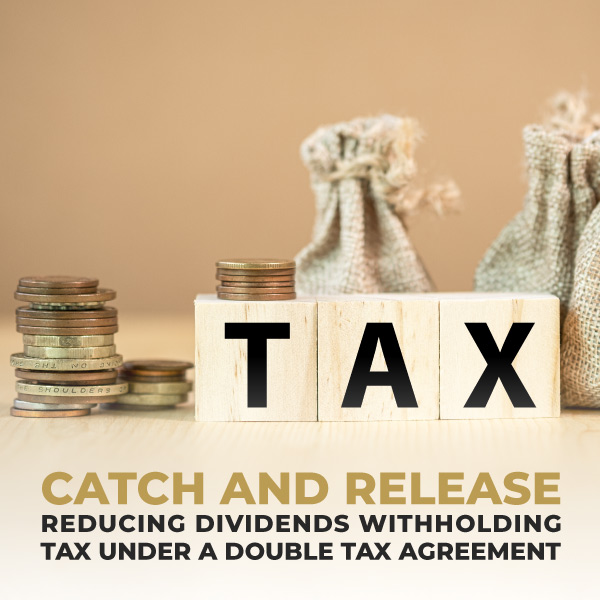CATCH AND RELEASE: REDUCING DIVIDENDS WITHHOLDING TAX UNDER A DOUBLE TAX AGREEMENT
Less is more, which could not ring truer than when it comes to withholding taxes. This is especially the case in respect of dividends, which are subject to a withholding tax of 20% in South Africa.
South African expatriates living abroad, who still hold shares in South African companies, are generally liable to pay this same dividends withholding tax rate. This means that when dividends are paid to taxpayers, they receive the net amount of the dividend after the tax has been withheld by the company and paid to SARS on their behalf.
Understandably, being aware that one is subject to this tax every time a company declares dividends could leave some taxpayers in a quandary. For taxpayers who are living abroad, they may be subject to further tax on the dividends in the other country, and in most cases, taxpayers might simply resign themselves to this fate. This sentiment is often spurred by the belief that, since the shares are held in South African companies, the dividends are “captured” and there is no way out of it.
Naomi Mudyiwa, Tax Associate and Cross-Border Tax Specialist at Tax Consulting SA, however, advises that this is not always the case.
If a person is a non-resident in South Africa for tax purposes, there is often relief available to them in respect of the withholding tax on dividends paid from South African companies. The application of this relief would be possible in terms of one of the many Double Taxation Agreements (DTAs) that South Africa has in place with various countries around the world.
However, this relief does not apply automatically to the dividends which are paid to a non-resident. The taxpayer must ensure that they comply with the legislative requirements and take the steps necessary for the application of the DTA. It is crucial that the taxpayer makes the appropriate disclosures to the correct parties, within relevant timeframes.
“Where the requisite legislative formalities are met, it is possible to reduce the South African dividends withholding tax rate, for example to either 15%, 10% or in certain circumstances even to 0%. Most of the DTAs that South Africa has entered into provide for this in some form,” Mudyiwa says.
With some concern, Mudyiwa notes that most South African non-resident taxpayers are not aware of this particular DTA relief. She advises that non-resident taxpayers with South African shareholding interests should seek assistance from a tax expert to find out whether they qualify for this relief by claiming the reduced withholding tax rate.
“A tax professional who is familiar with DTAs and the relevant SARS and legislative procedures will be able to assist taxpayers to assess their eligibility for this relief, as well as ensure that they meet the requirements and formalities required by the receiver of revenue. Taxpayers will still need to declare their dividends to SARS but would be able to claim the reduction in tax under the relevant DTA,” Mudyiwa concludes.
![2025-logo-[Recovered] Tax Consulting South Africa](https://www.taxconsulting.co.za/wp-content/uploads/2025/01/2025-logo-Recovered.png)


